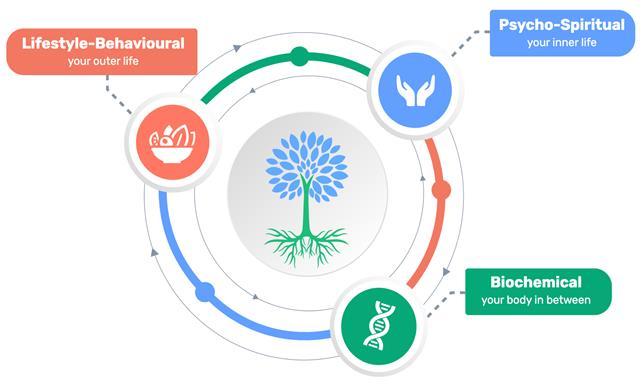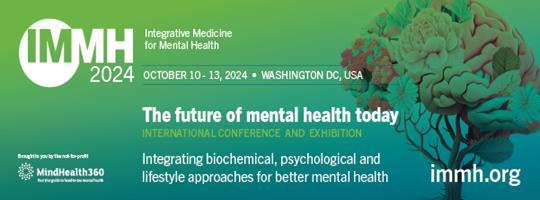
The next frontier in mental health care?
Integrative mental health & functional medicine psychiatry



The next frontier in mental health care?
Integrative mental health & functional medicine psychiatry

● Global burden of mental illness:
○ 1 in 4 people in the US and the UK are on psych meds
○ 50% of people in US have a mental illness at some point in their lives
○ 25% increase in depression and anxiety the first year of the covid pandemic
● Increase in deaths of despair (drugs, alcohol, suicide)
○ 150% increase between 1990 and 2014 in the US and 60% in the UK
● Suicide epidemic:
○ 2nd leading cause of death for 10-24 year olds
○ Suicide rates up 30% in the last 20 years, only half of which had a known mental health issue
● Increases in delayed neurodevelopment
○ CDC estimate autism prevalence increases by nearly 10% to 1 in 54 children in the US
○ Increase in ADHD diagnoses between 2007 and 2016 by 123% and has continued to increase
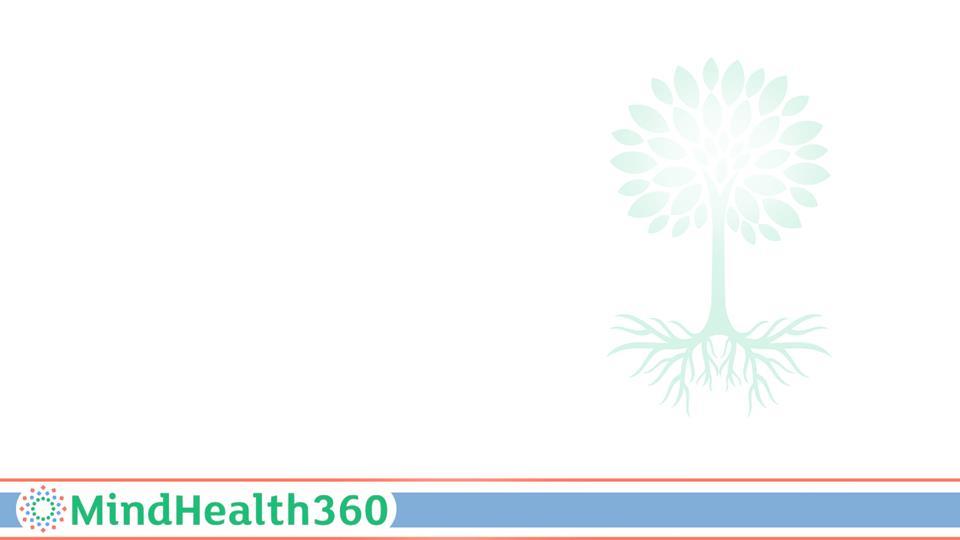
Functional and Integrative Medicine have in common and why they work better than conventional treatment
● Root cause rather than symptom relief (SSRIs, CBT)
● Personalised and precision (biomarkers and biochemistry) (fxmed more so than integrative)
● Preventative
● Biochemical, psycho-spiritual, lifestyle-behavioural
● Better for complex chronic conditions which are currently epidemic in our societies – not a pill for an ill but many variables
● Conventional psychiatry and the DSM focus on signs (few) and symptoms that form syndromes => Fxmed has a lot more tools to work out the signs
● While there are few studies comparing fxmed with conventional psychiatry, anecdotal evidence abounds
● Bredesen and Toups’ clinical trial which showed an 84% improvement in cognitive markers –Bredesen/Toups based on MoCA scores and CNSVS (CNS vital signs) using precision medicine over 9 months, 25 people

Bi-directional Relationship between psychological stressors (eg: trauma) and physiological ones (biochemical imbalances)
Psychological stressors and trauma cause biochemical imbalances
● ACEs and trauma => chronic biochemical imbalances => neuroendocrine, nervous system and immune dysregulation => psycho-neuro-immune imbalances (eg: inflammation, chronic cortisol) => lead to further biochemical imbalances such as mitochondrial dysfunction
● Trauma and ACEs (psychological stressors) can predispose to biochemical stressors such as toxins (moulds, eg “mould personality”) and pathogens (viruses, bacteria, eg: Lyme personality), making us more vulnerable
● Body has the same physiological reaction to stress whether it’s psychological, or physiological, so BOTH need to be addressed for sustainable healing
Why integrative approaches are essential for treating psychological trauma ctd.
Bi-directional Relationship between psychological stressors (eg: trauma) and physiological ones (biochemical imbalances)
Biochemical imbalances exacerbate psychological ones
● Biochemical stressors increase susceptibility to psychological ones, and may hamper the effectiveness of psychological therapies
○ Eg: zinc-copper imbalance, hormone imbalances, toxins such as cigaret smoke, mould, etc. infections, TBI, etc. prime us for trauma, ACEs, etc…
○ Dysregulate the nervous system, increase chronic cortisol and inflammation, hamper mitochondrial and immune function
● What determines how each person will react to psychological stressors and trauma? A combination of biochemical factors which can have an exacerbating or mitigating effect such as
○ Genetics
○ Toxins
○ TBI

○ Pathogens
Diet
Lifestyle factors (eg: sleep, exercise, etc.)
● Functionalmedicineisasystemsbiology–basedapproachthat focusesonidentifyingandaddressingtherootcauseofdisease.Each symptomordifferentialdiagnosismaybeoneofmanycontributingto anindividual’sillness.IFM
● Dr. Jeffrey Bland founded the IFM in 1991 to address the rise in complex chronic illness. Currently the leader in functional medicine training
● Integrativemedicineisanapproachtohealthcarethatincludes practicesnottraditionallypartofconventionalmedicine,suchas herbsandsupplements,meditation,wellnesscoaching,acupuncture, massage,movement,resiliency,andnutrition.Mayo

● Hard to find, especially if you are not in the US
● Takes more time and effort from practitioner and patient
● Less lucrative and more expensive for practitioner and patient
● Training not really standardized
● Supplements and treatments not standardized
● Overwhelming for patient
● Evidence difficult to obtain due to not one pill for an ill
● But with complex chronic conditions, the only way
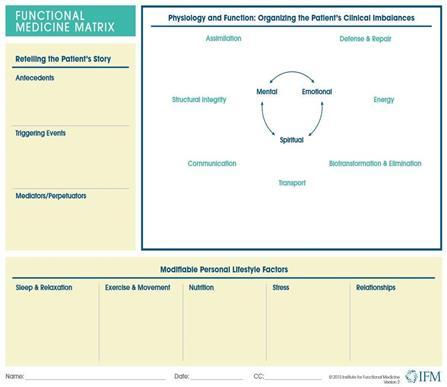


Poor Nutrition
● Caused by poor/SAD diet, processed foods, sugars => inflammatory
● Fats => low cholesterol, omega3/6 ratio
● Nutrient poor => poor diets and poor nutrition (due to bad soil) lacking in precursors such as macronutrients, amino acids and micronutrient cofactors to build hormones and neurotransmitters
● Lack of absorption due to gut issues
Microbiome
● Leaky gut
● Dysbiosis
● Gut and oral microbiome
● Lead to inflammation
● The majority of neurotransmitters such as GABA, dopamine, serotonin, made in the gut
● Caused by food allergies, stress, toxins, infections
Impaired methylation
● Due to genetic SNPs, either over or under methylation
Genetics/genomics
● MTHFR (affect methylation)
● COMT (affect metabolism of stress hormones)
● Cortisol and inflammation blocks genetic expression


TBI
● Traumatic brain injury => chronic microglial inflammation
● Disrupts the gut-brain axis
Infections
● Bacterial (eg: Lyme)
● Viral (eg: herpes, EBV, covid)
● PANS/PANDAS
Toxins
● Heavy metals
● Plastics
● Pesticides and herbicides
● Drugs, recreational and pharmaceutical
● Smoking
● Air pollution and water pollution
Biotoxins
● Moulds and mycotoxins

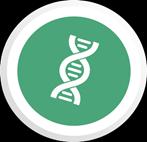
Neuroendocrine imbalances
● Too many or too few neurotransmitters
● Hormone imbalances => lead to neurotransmitter imbalances
● HPA and nervous system dysregulation can cause depression, mood swings, irritability, anxiety
● Caused by chronic stress, inflammation, gut issues, hormone fluctuations depending on time of life, toxins (eg: BPAs), infections
Lack of trophic factors
● Due to genetic SNPs, nutritional imbalances, lifestyle factors
● BDNF
● NGF
Metabolic dysfunction
● Insulin resistance is a driver of depression
● Blood sugar issues, hypoglycemia
Immune dysfunction
● Autoimmune conditions such as Hashimotos, celiac, lupus
● PANS/PANDAS


Inflammation
● Inflammatory cytokines such as IL-6, TNF-a, IL-1b, IL-8, CRP all correlated with mental health disorders according to meta analyses
● Causes of chronic inflammation => toxins and biotoxins, infections, poor nutrition (sugar), gut issues, hormone imbalances, chronic stress, lack of sleep
Mitochondrial dysfunction
● Lack of mitochondrial biogenesis
● Lack of appropriate apoptosis
Oxidative stress
● ROS

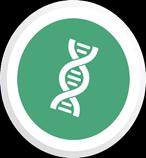
● Nutritional status (levels of various nutrients)
● Gut dysbiosis and permeability (stool tests, permeability)
● Hormones and neurotransmitters (sex and adrenal hormones)
● Toxic load (heavy metals, moulds, plastics, pesticides)
● Infections (viruses, bacteria)
● Inflammation (CRP, cytokines)
● Genetics and genomics (SNPs)



Nutrition/diet
● Mediterranean diet, paleo autoimmune, ketogenic diet => improves neuronal insulin sensitivity
● Blood sugar balance => low glycaemic index
● Remove food allergens => gluten
Nutrient supplementation
● B vitamins, B12 in particular, especially methylated B vitamins if MTHF
● Copper/zinc balance
● Magnesium => threonate and glycinate
● Omega 3s => 2-4g EPA/DHA
● D vitamin => 60-80, below 30 problematic
● Lithium orotate => 10-60mg, good for anxiety, depression, ocd, adhd, suicidality
● Inositol (OCD, anxiety)
● Phospholipids => phosphatidylcholine, phosphatidylserine => 1000mg
● Niacinamide => 1000-2000mg decreases glutamate and over-methylation
Methylation
● Impaired methylation can cause brain fog, depression, irritability, anxiety
● Impaired methylation can lead to elevated homocysteine levels

● Possibly due to the MTHFR genetic variant which can cause deficiency in cofactors such as B2, B6, B9, B12
● Keto, paleo, whole foods, high good fat, medium protein, low carb diet
● Gut friendly foods => fermented, fibre
● Avoid allergenic and inflammatory foods
● Gut repair supplements such as glutamine, liquorice, colostrum
● Vagus nerve training => humming, gargling, meditation, breathing
● Circadian rhythms
● 5Rs of gut repair => 1. remove 2. replace 3. reinoculate 4. repair 5. rebalance
Genetics/genomics
● Genomics test such as Intelxxdna or Lifecode Gx which gives recommendations based on personalised SNPs


Toxins
● Detoxifying foods => soluble and insoluble fibre; cruciferous, sulphur rich
● Detoxifying supplements => glutathione, NAC, milk thistle
● Detoxifying environment => cleaning and self care products, water, air
● Detoxifying activity => sweating, lymph movement
Biotoxins
● Binders => charcoal, clay, cholestyramine, S Boulaardi
● Anti-fungal foods and supplements =>oregano, garlic, coconut, olive
Infections
● Anti-viral and anti-bacterial foods and supplements => olive leaf, monolaurin, lysine, garlic, oregano
● Immune system boosting Inflammation
● Anti-inflammatory diet => plant based, low carb,
● Anti-inflammatory supplements => omega 3s (anti-inflammatory, anti-oxidant, neurotrophic, anti apoptotic), NAC (1200-2400mg), Curcumin (500-2000mg)
● LDN => decreased microglial activation
● HBOT


Neuroendocrine treatments
● Herbal and nutritional supplements for hormone and neurotransmitter balance
● BHRT
Mitochondrial function
● Hormesis (fasting, intermittent fasting, hot/cold exposure)
● Ketogenic, low carb diet Coq10, Pqq, magnesium, acetyl Carnitine
● Exercise
● Gut repair => anything good or bad for your gut bacteria good or bad for mitochondria
Neuroregeneration
● Exercise to boost NGF and BDNF
● Hormones
● Supplements to boost NGF and BDNF
Oxidative stress
● Antioxidants


● Trauma => priming for physiological stressors
● ACEs => scores of 4 or more => increased depression, addiction and suicide
● Attachment and relationship problems
● Difficult life circumstances
● Lack of purpose and meaning
● Lack of spirituality
● Chronic stress
● Mechanism => chronic inflammation, oxidative stress


● Coaching ● Somatic therapies ● Somatic experiencing
IFS
TIST
EMDR
Psychological therapies
Psychedelics
Spiritual tools and practices



● Lack of sleep
● Lack of exercise
● Lack of sunlight and nature
● Lack of community
● Lack of relaxation
● Poor breathing habits
● Unhealthy tech use

● Sleep hygiene => habits, light, supplements
● Adapted exercise
● Nature exposure => green/blues, fractals, forest bathing, circadian rhythms
● Community
● Relaxation => vagus exercises, massage, meditation, baths
● Breathing => techniques
● Digital hygiene and dopamine reset through hormesis


Use lifestyle and psycho-spiritual interventions to regulate the biochemistry.
Use biochemistry to regulate psycho-spiritual and behavioural factors.
